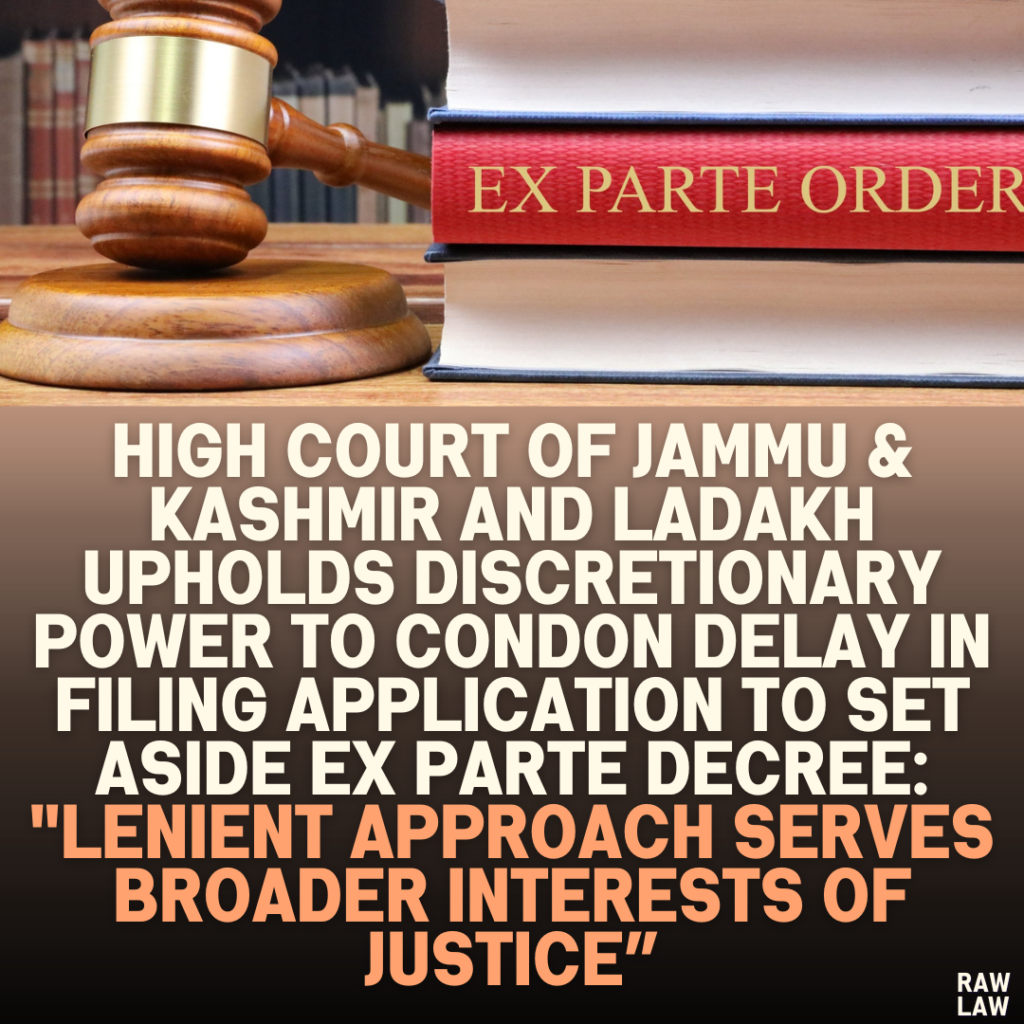Court’s Decision
The High Court of Jammu & Kashmir and Ladakh dismissed the petitioner’s challenge to the trial court’s order condoning the delay in filing an application to set aside an ex parte decree. The Court held that the trial court acted within its jurisdiction and that the discretion exercised by the trial court was based on settled legal principles, warranting no interference.
Facts
- The petitioner challenged an order dated December 27, 2022, by the trial court that condoned the delay in filing an application to set aside an ex parte decree.
- The ex parte decree was passed on August 23, 2014, after the respondents were set ex parte on September 5, 2012, due to non-appearance.
- The respondents claimed they were advised by their lawyer not to attend hearings, trusting him in good faith.
- The respondents became aware of the decree during execution proceedings on August 12, 2015, and subsequently filed for condonation of delay and setting aside the decree on December 15, 2015.
- The petitioner argued that the respondents had ample time to act upon learning of the decree but failed to do so promptly.
Issues
- Whether the trial court erred in condoning the delay in filing the application to set aside the ex parte decree.
- Whether the delay in pursuing legal remedies was justifiable based on the respondents’ explanations.
Petitioner’s Arguments
- The trial court passed the impugned order mechanically, ignoring the respondents’ inaction and prolonged delay.
- The respondents failed to act diligently even after obtaining a copy of the ex parte decree, further delaying proceedings unnecessarily.
Respondent’s Arguments
- The delay was caused by their reliance on their counsel’s advice not to attend hearings, which led to the ex parte proceedings.
- After becoming aware of the decree during execution proceedings, they took steps to address the situation, including obtaining the certified copy of the judgment and engaging a new counsel.
Analysis of the Law
The trial court referred to multiple judgments of the Supreme Court, emphasizing the principle that procedural delays should be condoned when litigants demonstrate a sufficient cause. It underscored that courts should avoid adopting a hyper-technical approach, particularly when the delay stems from factors outside a litigant’s control, such as reliance on counsel’s advice.
Precedent Analysis
The trial court’s reliance on precedents established by the Supreme Court highlighted the importance of granting litigants a fair opportunity to seek remedies, particularly when procedural lapses are adequately explained.
Court’s Reasoning
- The High Court affirmed that the trial court’s decision to condone the delay was based on legal principles and precedents, demonstrating no jurisdictional error.
- It emphasized that the trial court’s discretionary power should not be interfered with unless exercised arbitrarily or contrary to established law.
- The Court reiterated that a lenient approach towards procedural delays serves the broader interests of justice.
Conclusion
The High Court dismissed the petition, finding it misconceived and upholding the trial court’s order condoning the delay. It noted that the respondents had sufficiently explained their reasons, and the trial court’s exercise of discretion was justified.
Implications
This judgment reinforces the principle that courts should prioritize substantial justice over technicalities, especially when procedural delays are sufficiently explained. It serves as a reminder that reliance on counsel, even if misplaced, can constitute a valid ground for condonation of delay under appropriate circumstances.




Pingback: "Jammu & Kashmir High Court Directs Police Protection for Threatened Couple: 'Order Does Not Validate Marriage'" - Raw Law